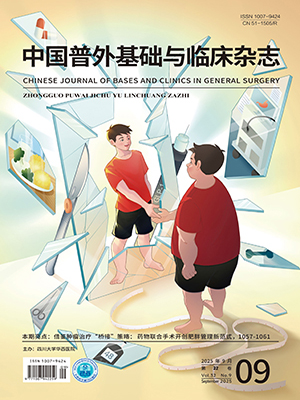Objective To investigate the effect of CO2 pneumoperitoneum on the tumor cell port site implantation in laparoscopic surgery.
Methods Male SpraqueDawley rats were intraperitoneally injected with gastric cancer cells (cell line SGC-7901). Continuous CO2 pneumo of 15 mm Hg or 30 mm Hg were established for 5 mins, 60 mins, 120 mins and 180 mins with the injection of different concentrations of tumor cells (104/ml, 106/ml respectively). Several samples of peritoneal washing served as positive control. All collecting dishes were incubated at 37℃ with 5% CO2 concentration for one week and then examined for the presence of tumor cell under microscope.
Results After one week of incubation, some of the dishes with continuous flow of CO2 gas (5 L/min) at pneumo 30 mm Hg for 60 mins or longer demonstrated tumor growth, and all peritoneal washing samples showed tumor growth, while other dishes showed negative.
Conclusion The research suggests that gastric cancer cells can cause port site implantation and the concentration of tumor cells, pneumoperitoneum pressure and duration may affect the occurrence of port site implantation. It may help to find a suitable way to prevent the port site implantation in operations.
Citation: ZHANG Haobo,WANG Hao,ZHEN Minhua. An Experimental Research on the Effect of Continuous CO2 Pneumoperitoneum on Tumor Cell Port Site Implantation in Laparoscopic Surgery in a Murine Model. CHINESE JOURNAL OF BASES AND CLINICS IN GENERAL SURGERY, 2002, 9(1): 16-18. doi: Copy
Copyright © the editorial department of CHINESE JOURNAL OF BASES AND CLINICS IN GENERAL SURGERY of West China Medical Publisher. All rights reserved




